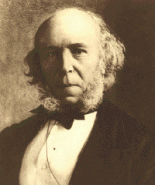
Herbert Spencer makes a distinction between the “militant type of society” based upon violence and the “industrial type of society” based upon peaceful economic activity (1882)
About this Quotation:
The distinction which Spencer makes between “militant” types of society and “industrial” types of society was one shared by a number of classical liberal writers who emerged during and after the Napoleonic Wars. These included Benjamin Constant, Jean-Baptiste Say, Charles Comte, Charles Dunoyer, and Frédéric Bastiat. Herbert Spencer made this idea a central part of his sociology and it would also play an important role in the thinking of economists such as Ludwig von Mises and many in the Austrian school.
Other quotes from this week:
- 2009: Cesare Beccaria says that torture is cruel and barbaric and a violation of the principle that no one should be punished until proven guilty in a court of law; in other words it is the “right of power” (1764)
- 2008: Jean-Baptiste Say argues that there is a world of difference between private consumption and public consumption; an increase in the latter does nothing to increase public wealth (1803)
- 2006: In Shakespeare’s The Tempest Caliban complains about the way the European lord Prospero taught him language and science then enslaved him and dispossessed him of the island on which he was born (1611)
- 2004: Adam Smith on the “Wonder, Surprise, and Admiration” one feels when contemplating the physical World (1795)
Other quotes about Origin Of Government:
- 2009: John Stuart Mill discusses the origins of the state whereby the “productive class” seeks protection from one “member of the predatory class” in order to gain some security of property (1848)
- 2007: David Hume on the origin of government in warfare, and the “perpetual struggle” between Liberty and Power (1777)
- 2007: Franz Oppenheimer argues that there are two fundamentally opposed ways of acquiring wealth: the “political means” through coercion, and the “economic means” through peaceful trade (1922)
- 2007: Tom Paine asks how it is that established governments came into being, his answer, is "banditti of ruffians" seized control and turned themselves into monarchs (1792)
- 2006: Frédéric Bastiat, while pondering the nature of war, concluded that society had always been divided into two classes - those who engaged in productive work and those who lived off their backs (1850)
13 June, 2005
 | Herbert Spencer makes a distinction between the “militant type of society” based upon violence and the “industrial type of society” based upon peaceful economic activity (1882) |
Central to Spencer’s sociology of the state was the distinction between what he called “militant” types of society and “industrial” types of society. In the former type of society he observed a close link between militant activities and economic protectionism as the following quote shows:
Whence it follows that the desire "not to be dependent on foreigners" is one appropriate to the militant type of society. So long as there is constant danger that the supplies of needful things derived from other countries will be cut off by the breaking out of hostilities, it is imperative that there shall be maintained a power of producing these supplies at home, and that to this end the required structures shall be maintained. Hence there is a manifest direct relation between militant activities and a protectionist policy.
The full passage from which this quotation was taken can be be viewed below (front page quote in bold):
§ 557. A remaining fact to be set down is that a society of the militant type tends to evolve a self-sufficient sustaining organization. With its political autonomy there goes what we may call an economic autonomy. Evidently if it carries on frequent wars against surrounding societies, its commercial intercourse with them must be hindered or prevented: exchange of commodities can go on to but a small extent between those who are continually fighting. A militant society must, therefore, to the greatest degree practicable, provide internally the supplies of all articles needful for carrying on the lives of its members. Such an economic state as that which existed during early feudal times, when, as in France, "the castles made almost all the articles used in them," is a state evidently entailed on groups, small or large, which are in constant antagonism with surrounding groups. If there does not already exist within any group so circumstanced, an agency for producing some necessary article, inability to obtain it from without will lead to the establishment of an agency for obtaining it within.
Whence it follows that the desire "not to be dependent on foreigners" is one appropriate to the militant type of society. So long as there is constant danger that the supplies of needful things derived from other countries will be cut off by the breaking out of hostilities, it is imperative that there shall be maintained a power of producing these supplies at home, and that to this end the required structures shall be maintained. Hence there is a manifest direct relation between militant activities and a protectionist policy.